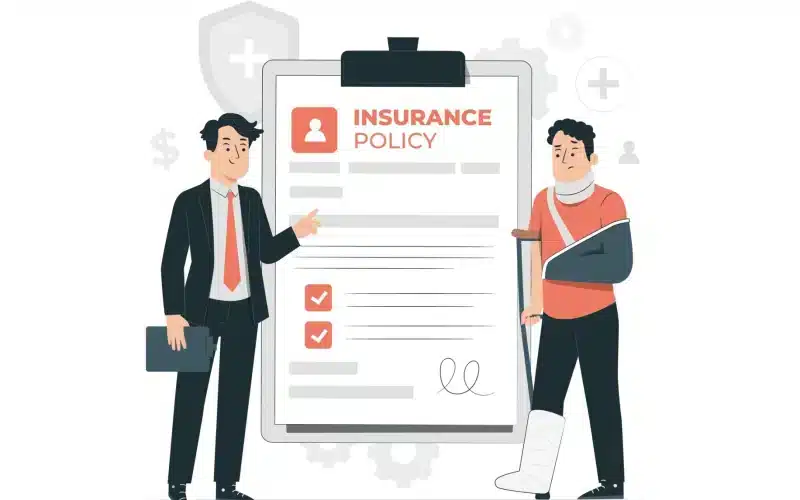There are many types of business insurance policies; these include coverage for property damage, legal liability, and employee-related risks, among others. Companies evaluate their commercial insurance needs based on potential risks, which can vary depending on the type of business and its environment.
Business insurance protects businesses from losses due to unexpected events during normal business operations. It works by transferring the financial risks faced by a business to an insurance company. These include accidents, lawsuits, or natural disasters.
Whether you have one or a few hundred employees, sell products or offer services, or command your operation from inside or outside your home, your insurance considerations as a business owner are quite different from those of an individual consumer. This is why it is important to have the right insurance.
Getting the right information on insurance can be the difference between success or failure when things go wrong with your business.
Types of business insurance
Property insurance
Property insurance covers the physical assets of a business, including buildings, equipment, inventory, and other tangible property. It provides compensation for losses due to events like fire, theft, vandalism, or natural disasters.
Property insurance helps businesses recover and repair or replace damaged or stolen property, minimizing the financial impact of such events. The type of coverage you need will depend on the property you own or rent.
Types of insurance under property insurance include:
Commercial property insurance
Commercial property insurance protects your physical assets (building, equipment, inventory, tools, furniture and personal property) and covers financial losses due to property damage from fire, theft or loss.
Business renters insurance
Business renters insurance is essential for businesses operating in one or more rented spaces. It will cover incidents within the space, including fire, floods, accidents, and building or property damage due to natural disasters. This type of insurance covers many things that the other policies also cover, but for rented spaces specifically.
Homeowners’ insurance
If you have a home-based business or store business property in your house, check the business coverage under your homeowners’ insurance. Homeowners insurance often only provides limited coverage (e.g., $2,500) for business property or equipment stored in your home, and some policies don’t cover business property at all.
Commercial auto insurance
Commercial auto insurance provides coverage for vehicles used for business purposes. It includes liability coverage for third-party injuries or property damage, as well as coverage for damage to the insured vehicle.
This type of insurance is similar to personal automobile insurance; it protects your cars, trucks or vans in the event of damage, injury or liability claims. However, commercial auto insurance provides additional coverage, including property and liability trailer exposure, loading and unloading exposure, hired vehicle coverage, non-owned vehicle coverage, and higher coverage limits.
Personal auto insurance
If you are self-employed and drive your personal vehicle for business purposes, you may be covered under your personal automobile insurance. If you own your car, truck or van and only use it occasionally for work, you may be able to make do with standard personal auto insurance designated for business use.
However, if you operate a company-owned vehicle, your vehicle is specifically designated for work, or you need higher coverage, you may need a commercial automobile insurance policy.
Liability insurance
Liability insurance protects businesses from legal claims and financial losses resulting from third-party injuries, property damage, or lawsuits. It covers legal defense costs, settlements, or judgments if the business is found legally liable for causing harm or injury to others.
General liability insurance
General liability insurance, also known as business or commercial liability insurance, is essential coverage for various claims, including bodily injury, property damage, personal or advertising injury, medical payments, products-completed operations, and damages to premises rented to you.
Professional liability insurance
Professional liability insurance, also known as errors and omissions (E&O) insurance, protects businesses that offer professional services. B2C businesses often use E&O coverage to protect against claims stating their services caused clients financial distress or bodily injury.
Business Owners Policy (BOP)
If you want general liability insurance and property coverage, you can package them together in a business owner’s insurance policy, also known as a BOP. A BOP provides liability coverage for customer injury, property damage, and product-related claims, in addition to commercial building and movable property coverage.
Contractors’ professional liability insurance
If your business is in the design-build or construction management industry, you are required to purchase some form of contractors’ professional liability insurance. This coverage protects professionals against construction errors or losses incurred when designing, engineering and constructing a building.
It can also protect you from errors made by third-party vendors associated with a project.
Employment Practices Liability Insurance (EPLI)
Small businesses with employees often benefit from employment practices liability insurance. This insurance type protects you if an employee files a claim against you for wrongful discipline or termination, sexual harassment, discrimination, negligent evaluation, breach of employment contract, mismanagement of employee benefits, or wrongful infliction of emotional distress.
Some insurers offer EPLI as stand-alone coverage, whereas others offer it as an endorsement to their BOP. Your policy’s terms and conditions will depend on the coverage you choose. Your business type, number of employees, and various risk factors all play a part in the cost of EPLI.
Directors and officers (D&O) liability insurance
If your business has a corporate board of directors or advisory committee, you want D&O insurance. This insurance protects your directors’ and officers’ assets if they are personally sued for wrongful acts in company management (e.g., failure to comply with workplace laws, fraud, theft of intellectual property, misrepresentation of company assets, or misuse of company funds).
Product liability insurance
Product liability insurance provides more protection and security than a standard product warranty or guarantee. This coverage protects your business if a product causes damage or injury to a third party, or if your business faces a product-related lawsuit. For example, if your product had a lithium battery that caught on fire, injuring the consumer, they could sue you. Product liability insurance covers you in this instance.
Management liability insurance
Management liability insurance is a combination of coverages used to protect private, public and nonprofit companies from various board-level exposures. It protects against the risks of managing a business and is purchased by organizations with a board of directors.
Workers’ compensation insurance
Workers’ compensation insurance provides coverage for employees who suffer work-related injuries or illnesses. It covers medical expenses, disability benefits, and lost wages for employees who are injured or become ill while performing their job duties.
Workers’ compensation insurance is typically required by law and helps protect businesses from potential lawsuits by employees seeking compensation for work-related injuries or illnesses. If an employee accepts the benefits of workers’ comp, they relinquish their ability to sue your company for the illness or injury.
Types of business insurance under this include:
Life insurance
You and any other members of your business can acquire a life insurance policy. This is similar to key person insurance, providing a beneficiary with financial assistance in the event of your death. Having life insurance in place can give you peace of mind that your death will not burden your family or business partners financially.
Key person insurance
Businesses often have a challenging time continuing operations when founders die. This is why it is essential for entrepreneurs to create a business continuity plan so the company can still thrive if the worst happens.
Also known as key man insurance or key woman insurance, key person insurance helps replace lost revenue due to the death of a key executive of your business. Your business pays the premium while the key person is alive and then collects a death benefit after their passing.
These benefits can be essential to continuing the operation of your business or finding someone to fill their role.
Disability income insurance
Disability insurance is similar to workers’ comp in that it temporarily covers an employee’s lost wages if they are unable to work because of a disability. However, disability insurance will cover injuries or illnesses that occurred on or off the job, whereas workers’ comp only covers work-related issues.
This type of insurance is also sometimes required by law.
Cyber insurance
Cyber insurance protects businesses against losses and liabilities arising from cyber threats and data breaches. It provides coverage for expenses related to data breaches, including legal costs, customer notification, credit monitoring, and reputation management.
Cyber insurance helps businesses manage the financial and legal risks associated with data breaches, cyber-attacks, and other cyber incidents.
Factors to consider when choosing business insurance
Business size
The size of the business, including the number of employees, annual revenue, and assets, can impact insurance needs. Larger businesses may require broader coverage and higher policy limits to adequately protect their assets and manage risks.
Business location
The location of the business can impact the types and costs of insurance coverage. Businesses located in areas prone to natural disasters, crime, or other risks may need additional coverage to mitigate potential losses.
Type of business
The nature and industry of the business play a crucial role in determining the appropriate types of insurance coverage needed. Different industries have specific risks and requirements, and businesses should consider policies that align with their operations and potential risks.
Industry regulations
Some industries have specific insurance requirements and regulations that businesses must comply with.
For example, businesses in the healthcare industry may need malpractice insurance, while construction companies may require liability coverage for worksite accidents.
Business risks
Each business has unique risks and vulnerabilities that need to be considered when choosing insurance coverage. A risk assessment can help identify potential threats and determine the appropriate coverage needed to mitigate these risks.
How much does business insurance cost?
The cost of small business insurance depends on your industry and the specific risk factors affecting your company. To evaluate the cost of your small business insurance coverage, an insurance agent will look at the following:
- The risk level of your industry
- The number of employees at your company
- The size, age and condition of your business property
- The location of your business
- Your annual income
According to a survey conducted by Insureon, the average yearly cost of business insurance is $1,281.
What you should consider before buying business insurance
Due to the crucial role that insurance plays in protecting a small business, industry experts advise companies to shop around and compare options from multiple providers to make sure that they get the protection they need at the best possible price.
Here are the key criteria that specialists say small businesses must consider when choosing the right policies:
- Premiums and deductibles: Experts warn small businesses against choosing the cheapest available policy, which could cost them tens to hundreds of thousands – potentially even millions in the long run. Companies should look for policies with premiums and deductibles that offer the best value for the amount of coverage and the relative level of risk facing their businesses.
- Coverage options: Many policies look similar across insurers in terms of which perils will or will not be covered. Small businesses should ask their insurance providers about adding or extending coverages to suit their business needs.
- Company reputation: Businesses should look for insurance providers with a good track record for customer satisfaction and fair business practices.
- Policy limits: Businesses should make sure that the limit of each insurance policy can cover the full value of the protection they require.
- Claims reporting: Businesses should also make sure that they can navigate the claims process easily to minimize financial losses and disruptions to their operations. The process is often laid out in the product disclosure statement of the policy.
- Financial stability: Companies should make sure that their insurer is in good shape financially to cover claims that may arise.
Benefits of business insurance
- Legal protection: Business insurance provides legal protection to businesses, covering legal defense costs, settlements, or judgments resulting from liability claims or lawsuits. It helps protect businesses from potential legal and financial consequences of third-party claims and lawsuits.
- Financial protection: Business insurance provides financial protection to businesses against unexpected events or losses, including property damage, liability claims, and lawsuits. It helps minimize the financial impact of these events, allowing businesses to recover and continue operations.
- Peace of mind: Business insurance provides peace of mind to business owners, knowing that they have coverage and protection against potential risks and losses. It allows businesses to focus on their operations and growth, rather than worrying about potential liabilities or unexpected events.
Risks of business insurance
- Premium costs: Insurance premiums can be a significant expense for businesses, affecting their profitability and cash flow. Businesses should carefully consider the costs and benefits of different coverage options to determine the most cost-effective insurance solutions.
- Under-insurance: Under-insurance occurs when businesses purchase insufficient coverage, leaving them vulnerable to potential risks and losses. This can result in significant financial losses and liabilities, as businesses may not have adequate coverage to manage unexpected events or claims.
- Over-insurance: Over-insurance occurs when businesses purchase more coverage than needed, resulting in higher premiums and unnecessary costs. This can be a significant financial burden for businesses, reducing their profitability and competitiveness.
- Insurance company insolvency: Insurance company insolvency can result in the loss of coverage and protection for businesses. It can be challenging to recover losses or liabilities from insolvent insurance companies, putting businesses at risk of significant financial losses.
What are the 4 main types of insurance?
Life insurance
Life insurance is essential if your family is dependent on your salary. Industry experts suggest a policy that pays out 10 times your yearly income. The two basic types of life insurance are:
- Whole life: can be used as an income tool as well as an insurance instrument. It includes a death benefit and also a cash value component. As the value grows, you can access the money by taking a loan or withdrawing funds and you can end the policy by taking the cash value of the policy.
- Term life: covers you for a set amount of time like 10, 20, or 30 years and your premiums remain stable. Commonly the most affordable type of life insurance, a term policy can work to cover the years during which a mortgage loan is outstanding or throughout your children’s college years.
Health insurance
Health insurance can be obtained through your employer or the federal health insurance marketplace. You can also buy private insurance for yourself and your family by contacting health insurance companies directly or going through a health insurance agent.
Long-term disability coverage
Long-term disability insurance supports those who become unable to work. According to the Social Security Administration, one in four workers entering the workforce will become disabled before they reach the age of retirement.
Many employers offer both short- and long-term disability insurance as part of their benefits package. This would be the best option for securing affordable disability coverage.
Auto insurance
Auto insurance provides coverage for vehicles used for both personal and business purposes. It includes liability coverage for third-party injuries or property damage, as well as coverage for damage to the insured vehicle.
What is the most common type of business insurance?
Business interruption insurance, also known as business income insurance, is one of the most common types of coverage most small businesses need. If a disaster strikes (such as a fire, flood, theft, building collapse or civil authority incident) and your business is required to shut down for a period of time, it will help cover lost income or operating expenses like mortgage or rent, loan payments, taxes, and payroll.
Is business insurance an asset?
Insurance becomes an asset when you experience a risk covered in your insurance plan, which activates your coverage. This allows you to make a claim and receive a successful payout.
For more context, insurance that is paid in advance is considered a prepaid expense under the current asset in the balance sheet of the company. Once the insurance amount becomes due it is considered an expense.
Recommended Articles
- How to Get Small Business Insurance: Complete Guide
- Business Insurance: Definition, Types & What Does It Cover?
- Business Insurance For LLC: What It Is & Best Options






